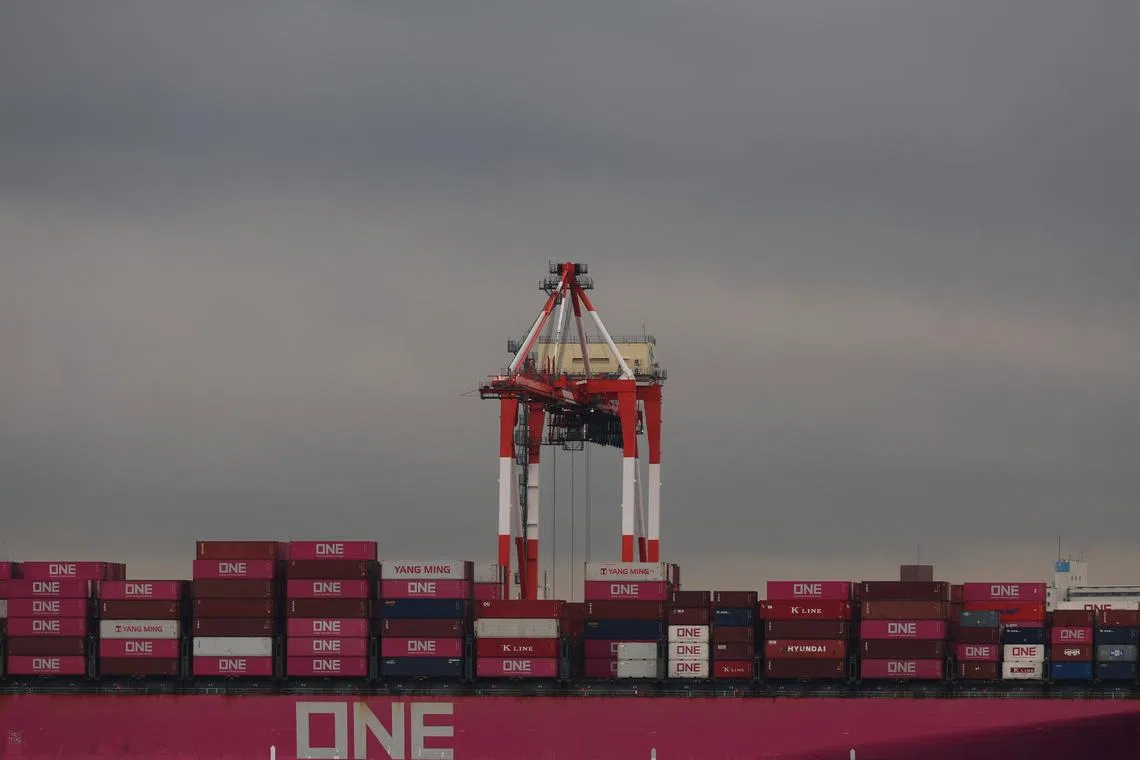Japan says no plan for big concessions, no rush to reach deal in talks on US tariffs
Sign up now: Get insights on Asia's fast-moving developments

Japan and the US will begin trade talks on April 17 in Washington that are expected to cover tariffs, non-tariff barriers and exchange rates.
PHOTO: REUTERS
TOKYO – Japanese Prime Minister Shigeru Ishiba said on April 14 his country does not plan to make big concessions and will not rush to reach a deal in upcoming tariff negotiations with US President Donald Trump’s administration.
Japan, a long-time US ally, has been hit with 24 per cent tariffs on its exports to the US though these tariffs have, like most of Mr Trump’s sweeping “reciprocal” tariffs, been paused for 90 days.
But a 10 per cent universal rate remains in place, as does a 25 per cent duty for cars
The US is Japan’s biggest export destination, and automobile shipments account for roughly 28 per cent of its exports there.
The two countries will begin trade talks on April 17 in Washington that are expected to cover tariffs
“I’m not of the view that we should make big concessions for the sake of wrapping up negotiations quickly,” Mr Ishiba said in Parliament, though he ruled out slapping Japanese tariffs on US imports as a countermeasure.
“In negotiating with the United States, we need to understand what’s behind Trump’s argument both in terms of the logic and the emotional elements behind his views,” Mr Ishiba said, noting that US tariffs have the potential to disrupt the global economic order.
Bank of Japan (BOJ) Governor Kazuo Ueda warned of forthcoming pain.
“US tariffs will likely put downward pressure on the global and Japanese economies through various channels,” Mr Ueda told the same Parliament session.
In addition to its large trade surplus with the US, Mr Trump has also accused Japan of intentionally maintaining a weak yen – leading to expectations that Tokyo could come under pressure to strengthen its currency – even though a broad dollar sell-off has pushed up the yen of late.
The slow pace at which the BOJ is raising borrowing costs from ultra-low levels could also come under fire in the talks, sources have previously said.
Japanese Economy Minister Ryosei Akazawa, who will lead Japan’s delegation, said any discussion on currency rates will be held between Japanese Finance Minister Katsunobu Kato and US Treasury Secretary Scott Bessent.
Mr Kato said: “Both countries share the view that excessive market volatility would have adverse effects on the economy.”
Any discussion on the yen may spill over to monetary policy and complicate the BOJ’s decision on how soon, and by how much, it should raise still-low interest rates.
Mr Akira Otani, a former top central bank economist who is currently managing director at Goldman Sachs Japan, said the BOJ could consider halting interest rate hikes if the yen were to approach 130 to the dollar.
Conversely, a yen slide below 160 could bring forward or accelerate future rate hikes, he said.
The dollar fell 0.62 per cent to 142.62 yen on April 14.
Japan has historically sought to prevent its currency from rising too much, as a strong yen hurts its export-reliant economy. But a weak yen has become a bigger headache in recent years as it has boosted import costs and hurt consumer spending.
Ruling and opposition party lawmakers have escalated calls for the Japanese government to cut tax or offer cash payouts to cushion the economic blow from rising living costs and Mr Trump’s tariffs.
Mr Ishiba said the Japanese government is not thinking of issuing a supplementary Budget now, but stood ready to act in a timely fashion to cushion any economic blow. REUTERS


